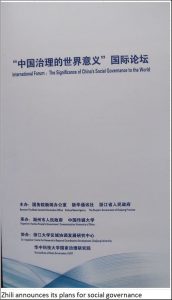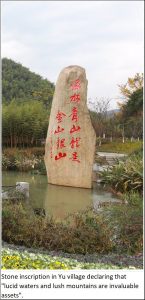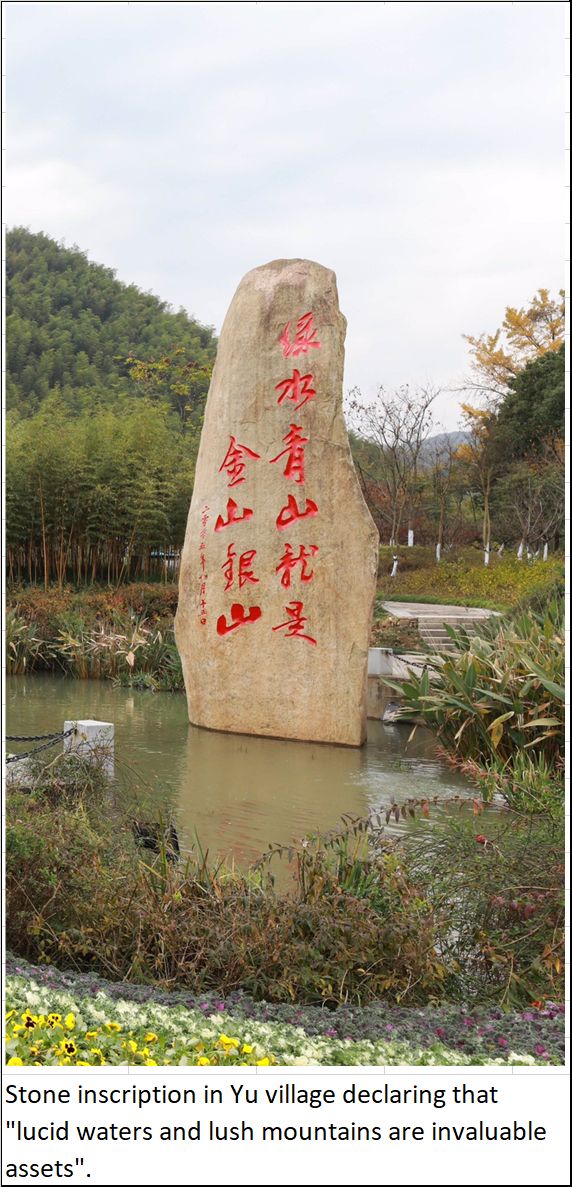China begins serious work on social governance structures
RN Bhaskar
On November 17, 2019, the People’s Government of Wuxing District, Houzhou, China, held its inauguration ceremony of the Nan Taihu Social Governance Institute. It marked the birth of a thinktank dedicated in studies on social governance at the grassroots level. The event was also being held to showcase to the world the significance of China’s governance. The ceremony was held in Zhili (pronounced more like Chile but with the first syllable sounding halfway like Julie). Zhili is part of Yu village which is part of the Angi County and is affiliated to Houzhou City, Zheijang Province in China.
 Social governance has been practiced in Yu village for more than a decade now. The think tank will formalize processes which could be used by other states to replicate the Yu model. The social governance institute is significant because it is the culmination of the proposals made in the 19th National Congress of the Communist Party of China (CPC) in October 2019.
Social governance has been practiced in Yu village for more than a decade now. The think tank will formalize processes which could be used by other states to replicate the Yu model. The social governance institute is significant because it is the culmination of the proposals made in the 19th National Congress of the Communist Party of China (CPC) in October 2019.
It reinforces the close connection between speedy dispensation of judicial redress at the grassroots level, which in turn reduces the cost of doing business. This was something the Romans too knew. They set up courts for speedy disposal of cases, because they knew that delayed justice comes with a very high economic cost.
In fact, social governance is one of the key factors which contributed to Zhili becoming one of the most important industrial centres in China. It is the world’s largest centre for the manufacture of children’s garments. Zhili is also a centre for high tech companies like Tony Electronics which focusses on micro alloy wire and other metal matrix composite materials research and development, used in the fields of consumer electronics, photovoltaic, new energy vehicles, and medical. Tony Electronics is supplier to the world’s top 500 companies such as Apple, Belsen, Hitachi, Sumitomo, Foxconn, BlueThink Technology, and Bourne optical.
 In some ways, it is like the Panchayati Raj India has espoused for long, but lacked the political will and judicial sagacity to enforce. It highlights the close linkage between business growth and success, and the need for low-cost, speedy and effective dispute redressal. The Yu model thus becomes both a business enabler and a social binding agent.
In some ways, it is like the Panchayati Raj India has espoused for long, but lacked the political will and judicial sagacity to enforce. It highlights the close linkage between business growth and success, and the need for low-cost, speedy and effective dispute redressal. The Yu model thus becomes both a business enabler and a social binding agent.
The Yu model has its roots in the statement made by Xi Jinping on October 15, 2005 (he was then secretary to the Xhejiang Provincial Party Committee, and before he became President of the country). He had gone to investigate “the Rule of Law in Zhejiang”. He had then fully affirmed the practice of Yu village in promoting “democratic elections, democratic decision making, democratic management and democratic supervision”. Zhili was to be the pilot site tor “the integration of the rule of law, rule of autonomy and rule of virtue.”
According to an analyst, “The Yu village experience has creatively established a rural social governance system similar to the eco-system – an organic and coordinated self-organising system which has formed a series of ecological products such as village regulations to offer civil services, judicial services, public welfare services and market services, and has built a new social relationship with multiple interactions and coordination.”
In this system, the local community works in tandem with judges appointed by the state and dispense speedy justice for any dispute arising between neighbours, businesses and corporates – sometimes even disputes between the community and the corporate. The idea is to allow local laws to integrate with national laws –distinct, yet part of an entire legal structure. This, gradually, gives people a new perspective.
As an official document puts it, “A harmonious society is not a society without contradictions and the society always advances in resolving contradictions. In recent years, the villagers have changed a lot – from learning from the law, knowing the law, and obeying the law to believing the law, respecting the law and using the law.” That in turn leads to fewer contradictions, explain experts, and sometimes even to zero disputes and petitions.
Social governance also includes another exhortation of Xi Jinping – made in 2004 — that “lucid waters and lush mountains are invaluable assets (local villagers translate this as “clean water and green mountains are mountains of gold). As a result, the entire area is verdant with flowing streams carrying clean water.
Today, the district is growing in its appeal for tourists who want to see for themselves how natural beauty and industrial progress can exist. It is a major centre for innovative (including organic) farming. And it is a beehive of business activity too. More on the business activity later.






































COMMENTS